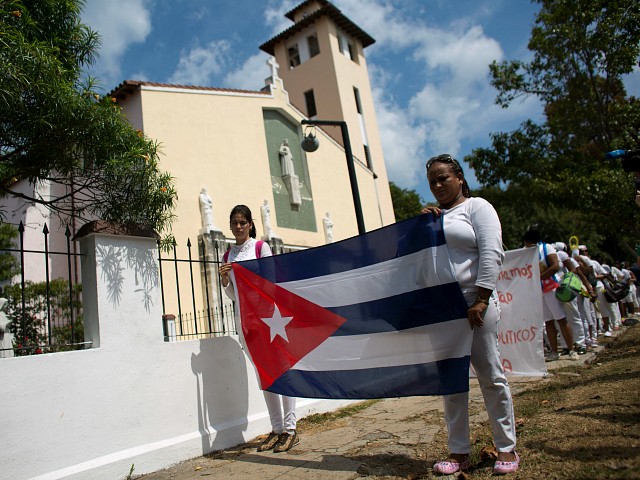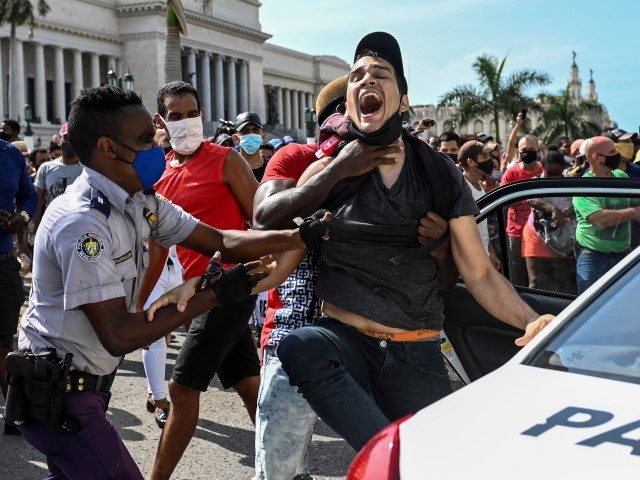The communist Castro regime of Cuba is fiercely punishing political prisoners arrested during the nationwide July 11, 2021, protests for their unwillingness to comply with the regime’s “ideological rehabilitation,” meant to make them loyal to communism, family members of the detainees told Radio Televisión Martí on Monday.
The detainees being punished were all sentenced to serve prison time for having taken to the streets calling for the end of Cuba’s communist regime during the July 2021 nationwide protests, in which hundreds of thousands of Cubans participated across almost every city of the island nation. The vast majority of manifestations across the island that day were peaceful, save for the beatings and other violent behavior by Cuban state security agents against protesters or bystanders mistakenly identified as protesters.
Families of those imprisoned told the U.S. government-backed outlet Radio Martí that their relatives have been beaten, relocated to other prisons, denied visits, and denied medical treatment for their respective conditions.
Cuban citizen Dayana Aranda Batista told Martí that she has not been able to see her husband, Juan Enrique Pérez Sánchez, for the past two months. Pérez Sánchez, 41, was relocated from the Melena II prison to the Quivicán prison on August 5 for having been on hunger strike since February. His wife was told that, as punishment, Pérez Sánchez was kept outside all night wearing only his underwear on the eve of his relocation.
He is serving prison time for the alleged crimes of “sabotage,” “disrespect,” and “public disorder.”
“The last thing I know about my husband is that he remains in his position, that he refuses to continue wearing the clothes of a common prisoner. They restricted all calls and visits from him, took away all inmate privileges, and keep him in the same [military] detachment with killers serving up to 40 years for murder. He is the only person from July 11 who is in that detachment,” said Aranda Batista.
Another relative of a political prisoner, Mailín Rodríguez Sánchez, stated that police have barred her from seeing her husband, Yosvany Rosell García Caso, since last week and that she is not being allowed to bring him food or medicine.
Yosvany Rosell García Caso, a self-employed man, was sentenced by the Castro regime to serve 15 years in the Cuba Sí prison, located in eastern Holguín, for the alleged crime of “sedition.” His wife claims that García Caso is being punished for trying to dress in white clothing on the anniversary of the July 11, 2021, protests.
Anti-communists on the island have adopted the color white as a way of showing opposition to the regime. It is most prominently featured in the uniform of the Ladies in White, an organization of the wives, mothers, sisters, and daughters of political prisoners whose sole act of protest is a weekly attempt, usually thwarted with state violence, to attend Catholic Mass wearing white.

Ladies in White, a women’s dissident group that calls for the release of political prisoners, begin their weekly march in Havana, Cuba, Sunday, March 20, 2016. (AP Photo/Rebecca Blackwell)
In addition to the traditional symbolism of the color white as representative of purity in Western culture — and its significance in a classic poem by Cuban founding father José Martí — the color white is notable for its use in the practice of the Lucumí, or Yoruba santería religion of Cuba, based on Nigerian paganism. It is considered the color of the creator god Obatalá.
“On August 23 he had the conjugal visit and, again, it was suspended, because he is punished due to everything that happened on July 11 and the subsequent hunger strike. The situation is terrible, because they wait for the bag of food that someone brings them from home, because the prisoners there are starving to death,” Rodríguez Sánchez said of her husband in the Martí interview.
Lizandra Góngora Espinosa, a Cuban mother of five, was sentenced by the Cuban communist regime to serve 14 years in prison for the alleged crimes of “sabotage,” “armed robbery,” and “public disorder” due to her participation in the July 2021 peaceful protests.
Her husband, Ángel Delgado, told Radio Televisión Martí that Góngora Espinosa is slated for relocation soon.
“I am taking care of three minors at home, and I am the only one who visits her, therefore, by moving her far away, I will not have the possibility to go to the visits,” Delgado said.
Ángel Delgado also stated that his wife suffers from a skin condition for which the Cuban authorities are not letting her receive treatment.
“Lizandra suffers from this skin disease caused by stress that is already affecting almost her entire body, and they won’t let me take a picture of her with the phone so that I, with my own means, can take it to a dermatology specialist,” explained Delgado.
Reports indicate that by the time of the first anniversary of the July 11, 2021, protests, the Castro regime had conducted more than 1,400 arrests in retaliation to the protesters. The Castro regime also held mass trials against protesters with no due process, indiscriminately prosecuting children and adults with mental health issues alongside able-bodied adults in its mass trials for “crimes” such as “sedition,” “rioting,” and “counter-revolutionary thinking.”
Human Rights Watch published a report on the anniversary of the protests documenting a great number of systematic human rights violations that the Castro regime had so far inflicted upon the protesters, as well as the abusive trials held in military courts, and detailing cases of torture suffered by the detained.
Christian K. Caruzo is a Venezuelan writer and documents life under socialism. You can follow him on Twitter here.

COMMENTS
Please let us know if you're having issues with commenting.